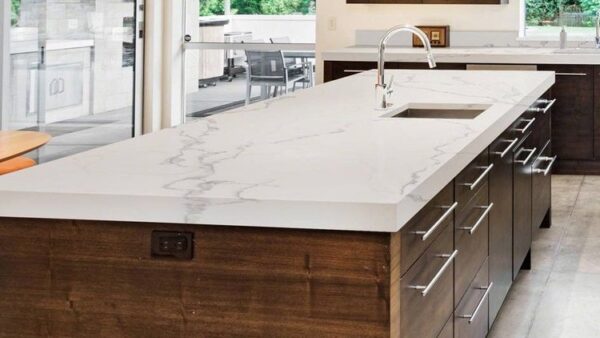Engineered quartz countertops and granite and marble are among your greatest options if you’re remodeling your kitchen or bathroom. It has earned the trust of many local homeowners and remodelers for many years.
This article has compiled a list of the most asked questions about quartz countertops to help you understand them better. Let’s delve into them.
What is Quartz?
Quartz, the second most prevalent mineral on earth, is a crystalline form of silicone diode. Its impurities, like those found in amethyst, citrine, and cairngorm, give it its characteristic colors. It is often found in igneous, metamorphic, and sedimentary rocks. Quartz is a plentiful and enduring substance used in various products, including electronics and building materials.
Where can quartz be found?
Quartz can be found all around the world, but the biggest natural quartz mines are in Arkansas and Brazil. The 44-ton largest known naturally occurring quartz crystal was discovered in Brazil. The surfaces of beaches, rivers, mountains, and deserts all contain significant amounts of quartz. Even though quartz is a mineral frequently encountered, pure, superior quartz crystals are rarely found. The Spruce Pine Gem Mine in North Carolina is one of the few places where exceptionally pure quartz may be mined. India also has enormous reserves of pure quartz.
What are the uses of quartz?
Quartz is a key fiberglass component and is widely utilized in glass production. Quartz is a great choice for an abrasive due to its hardness and is used to manufacture sandpaper and for sandblasting. It is frequently used for traction purposes in the railroad sector and as a filler in paint and rubber products. Quartz is common in electrical devices like watches, televisions, and cell phones. This mineral is the most diverse of all minerals since it comes in a wide range of hues and shapes, making it one of the most beneficial organic materials.
How are quartz countertops produced?
93% ground quartz is the main component of these countertops, which are then bound together with polyester resins. Color is added through the use of pigments. Kitchens look good with quartz; some designs even include tiny bits of recycled glass or metallic flecks.
What makes quartz countertops so popular?
Being one of the earth’s hardest rocks, quartz, often known as “engineered stone,” is undoubtedly the most durable material for home countertops. Quartz is created in a factory, as opposed to other natural stone slabs that are mined. Other reasons why many people love quartz countertops include:
- They can be produced in various hues, from vivid red to lime green, as well as the traditional neutral shades of cream, black, and brown.
- Since quartz is stronger than granite or marble, it is less likely to break or chip.
- Because it is non-porous, unlike other tabletop materials, it won’t allow bacteria to grow in crevices.
- Oil, juice, wine, tomato, coffee, and other substances don’t affect the color because it is stain-resistant.
Do quartz countertops chip or crack easily?
No. These countertops are made of incredibly sturdy materials that don’t easily break or damage even under daily use. However, if struck hard, edges may be more prone to chipping, but the harm is typically fixable. Your durable quartz countertop is very resistant to scratches, but if one does occur, you should be able to remove it with some buffing. Use a chopping board and hot pads underneath any hot things on a daily basis to protect your counters. It’s advisable always to ask your manufacturer if a chip or a scratch may be fixed.
What are the main differences between quartz and granite/marble?
Given the considerable investment that a new kitchen represents, it only makes sense that you would want to ensure you select the best surface possible. Because quartz surfaces are man-made, they come in various colors, and each slab of a given color might have a unique pattern. This gives consistency over your entire work surface, which is sometimes difficult to achieve with real stone.
Since granite and marble are natural materials, each piece is distinct, making them more “unique” worksurfaces. While this may be viewed favorably by some, it may be viewed negatively by others because you won’t know how your kitchen will actually look until the countertop is installed.
Do you need to seal off quartz slabs?
Quartz doesn’t require a sealer; it is still strong and lovely without one. Despite quartz slabs’ inherent resistance to stains and microbes, polymer resin binders significantly improve these properties. These qualities make it unnecessary to treat quartz slabs before installing them.
In what other areas of the house can you use quartz?
Quartz is ideal for coffee tables, fireplaces, shower edges, window sills, bathroom vanity tops, and shower counters. Businesses frequently choose quartz for their food service counters, conference tables, and reception tops. Quartz shouldn’t be used outside since prolonged exposure to ultraviolet radiation might fade its hue.
Is quartz heat resistant?
Quartz is more heat resistant than laminate surfaces but it is not as heat resistant as granite or other stone countertops, so caution should be taken. Quartz surfaces are susceptible to direct heat, such as using hot pots straight from the oven, due to the resin component of the surface. For hot pans or hot hair tools in the bathroom, trivets and hot pads should be utilized in order to preserve quartz’s aesthetic appeal.
How do you clean and care for quartz countertops?
You only need diluted dish washing solution and a soft microfiber cloth or sponge to clean your white or dark quartz countertops. Avoid using abrasive scrubbers to clean your quartz countertops in the kitchen and bathroom.
Can I install quartz countertops myself?
Quartz countertop slabs are quite heavy and difficult to handle. So it’s better to let a professional install it for you. This way, they will ensure the work is done excellently and swiftly.

